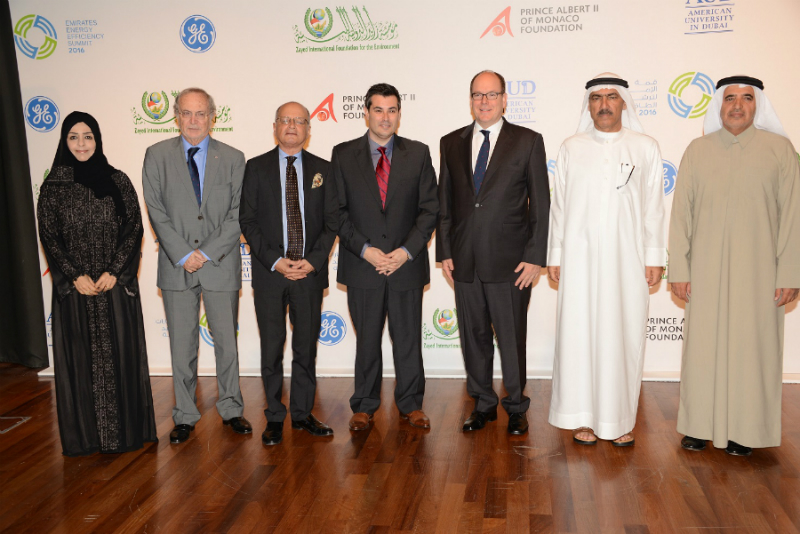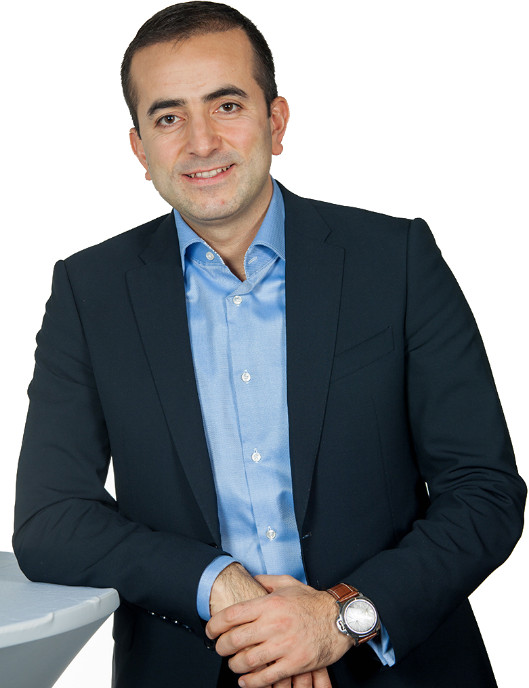Forces like IoT and climate change are coming together, making the present the ideal time to move the energy efficiency agenda forward, says experts at the inaugural edition of the Emirates Energy Efficiency Summit. We bring you the report.

(L-R): Dr Meshgan Al Awar, Secretary General, Zayed International Prize for the Environment; H.E. Bernard Fautrier; Lance de Masi; Agostino Renna; H.S.H. Prince Albert II of Monaco; Mohamed Ahmed Bin Fahad; H.E. Ahmad Butti Al Muhairbi
Make no mistake – future generations are going to look back at this time in history and judge today’s generation by how it addresses the need for energy efficiency. Agostino Renna, Chief Commercial Officer of GE Energy Management, made sure to hammer this point in, when he delivered the welcome remarks on the second day of the inaugural edition of the Emirates Energy Efficiency Summit (EEES), staged at the American University in Dubai (AUD), in the UAE.
“Looking at the world we live in and the forces acting on all the things that we know and do,” Renna said, “there has never been a better time for us to scale the energy-efficiency agenda, to move it forward. My theory is that this generation will be remembered for what we did with the problem of energy. Our generation will be remembered for that, so the time [to act] is now.”
Forcing up to the issues
While addressing the participants and the attendees of the Summit, which was held on February 3 and 4, Renna said that having been around the discussion on climate change and energy efficiency for most of his professional career, he could confidently say that the timing has never been better to tackle both. “Four powerful global forces,” he said, “are coming together to make this the opportune time to take advantage of some very important motivations on the planet.”
The first of the four forces, explained Renna, is slow economic growth “where volatility is the new norm”. Elaborating, he noted, “If we look at global economies, [we’d see that] there’s not a single country in the world that is not challenged, to varying degrees, by slow growth.”
National GDPs, Renna explained, are driven by two factors: The size of the working population and the relative productivity of that population. “When you think about it from that perspective,” he said, “then the notion of energy productivity becomes fundamental to the conversation on economic advancement. And so I believe that this current condition of slow growth could actually lead well to a platform for energy efficiency.”
Naming climate change as the second force, Renna observed that while it may have been an idea that first took root among the scientific community, it is now recognised as a legitimate concern by society at large. “Try asking children now about climate change and you’ll see that they can relate,” he said. “Not only that, they also feel that they ought to be doing something about it.”
Much like GDPs, climate change is driven by two dynamics, the first being population growth, Renna said, before revealing that, according to demographic studies, the coming few years will see India and China’s population increasing to more than 2.5 billion. He further drove his point across by remarking, “It wasn’t so long ago that the entire planet had 2.5 billion people on it. In fact, it was in the 1950s.”
Strongly connected to the first, the second dynamic that’s driving climate change – as per Renna – is people’s aspiration for a better standard of living. “As the population increases, there is an aspiration for what I would characterise as a wealthier lifestyle,” he said. “You can contextualise the word ‘wealth’ based on where you live in the world, but essentially, an increasing population would mean more people on the planet wanting to do more things, thus resulting in an unprecedented demand for energy and natural resources.”
Citing the Internet of Things (IoT) and social media as the other two forces, he described both as enabling platforms, noting that IoT is allowing “the physical and analytical worlds” to come together, while social media is providing users “the opportunity to have instantaneous conversations with masses and masses of people”.
Renna, giving more details on IoT, added: “Being able to embed intelligence and ‘sensing’ pieces of equipment in devices and machines allows us to extract data and then use statistical analytics to be able to draw insights from the extracted data. With those insights, we will be able to take action that will drive productivity.”
Social media, meanwhile, affords people with the “ability to iterate and test ideas, and more importantly, once those ideas show promise, the ability to scale them at a pace and with an intensity and focus never seen before”.
A joint effort
In addition to Renna, Dalya Almuthanna, President and CEO of GE Gulf; H.E. Bernard Fautrier, Vice President and CEO of The Prince Albert II of Monaco Foundation; Lance de Masi, President of AUD; and Mohamed Ahmed Bin Fahad, Chairman of the Zayed International Foundation for the Environment, were also present to welcome the delegates to the two-day event.
Founded and organised by GE and The Prince Albert II of Monaco Foundation, the Summit featured speakers from the public and private sectors, including H.E. Ahmad Buti Al Muhairbi, Secretary General of the Supreme Council of Energy; Abdulla Alshahyari, Acting Director of the Conservation and Efficiency Department at the UAE Ministry of Energy; Frank Wouters, CEO of the EU-GCC Clean Energy Network; Iain Campbell, Managing Director of the Rocky Mountain Institute; and Saeed Al Abbar, Chairman of the Emirates Green Building Council.
Also taking to the stage during the event, H.S.H. Prince Albert II of Monaco summed up what EEES was all about: “As a follow-up to the Euro Mediterranean meetings organised in Monaco over the past five years, the Emirates Energy Efficiency Summit offers a global approach to energy issues, due both to the questions raised and the eminent figures who provide the answers – how can we mobilise individuals, companies and states for fundamental change, which is not cost-neutral, and whose results are sometimes distant? This question is, I believe, at the heart of any environmental commitment.”
[div class=”row”]
[div class=”col-md-10 col-md-offset-1 content-sidebox”]
‘Energy efficiency is no longer an option but a must’
At the conclusion of EEES, Erdem Soyal, Project Sales General Manager for GE Middle East, Africa and Turkey, shared with Climate Control Middle East his views on the Summit and a preview of Current, GE’s new start-up.
What is your general assessment of the Summit? What were your expectations going in, and were those expectations realised?

Erdem Soyal
The idea of the event was to talk leadership, so we can address crucial subjects. We wanted to bring market experts and key stakeholders and decision-makers to address, first, how we can make efficient use of our resources; second, how to optimise our assets; and third, how we can increase our productivity with the existing resources.
Considering the audience and the content of the presentations, I believe we achieved what we set out to do.
The event was divided into three parts – informed, motivated and accountable. What was the reason behind the decision?
We decided on the three clusters of presentations, because we really sought to create change and communicate a call for action. With this kind of events, allowing for the flow of information without requiring action would not make any sense. All who came spent their valuable time here, and we wanted to acknowledge and make use of that by, first of all, laying out the scenario and informing people of what the issues are and what the key requirements are to achieve energy efficiency; second, by encouraging people to come on board and become part of the movement for change; and third, by instilling in everyone, especially the decision-makers, a sense of accountability for the courses of action that need to be adopted.
Some of the speakers touched upon the UAE government’s vision statements and plans of action, including Dubai’s target of using clean energy sources to provide 75% of the country’s energy by 2050. In your opinion, how feasible are the government’s goals?
Having the ambition is one thing, because that’s being motivated. Being accountable, however, is another thing. The ambition is definitely very strong – wanting to retrofit 30,000 buildings, for example, is an ambitious plan. So, I think, what we need now is to be in rigorous execution mode, because we need to have the right regulations in place. We need to have the right resources and the right people in place, so we can drive this forward as fast as we can. The climate is changing – the world is changing. We don’t have time anymore, and therefore, energy efficiency is no longer an option but a must.
I understand that GE has a new start-up – an energy company called Current.
That’s correct. Current is a new, first-of-its-kind energy company, which will look into not only lighting but the total energy bill of the building. It will do this by integrating LED, solar, onsite power, energy storage and electric vehicles, with its Predix platform, making it perfectly in line with the Dubai Smart City initiative.
We’ll have a soft launch very soon. It’s all very exciting, because presently, what we do is go to real-estate owners, government agencies and other stakeholders, with the proposition to only change the lights so they can, for example, save 60-80% energy with their lighting. But in the future, we’ll approach the same people and say: You know what, we’ll install new technology and we’ll manage the whole energy bill for you, which could result in a reduction of 10-20%. That’s a significant figure, and it’s directly connected with what has been discussed [in] the last two days.
You’ll hear more about Current in the market and about the direction [where] GE is going – the direction where future energy companies need to go. We need to really become more conscious about our energy consumption and think about how we can manage it more efficiently.
[end-div]
[end-div]
Copyright © 2006-2025 - CPI Industry. All rights reserved.